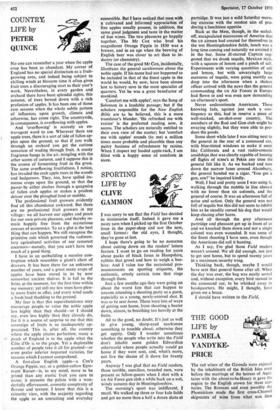COUNTRY, LIFE by PETER QUINCE
No one can remember a year when the apple crop has been so abundant. My corner of England has no special distinction as a fruit- growing area, and indeed being subject to chilling winds at blossom time it often gives fruit trees a discouraging start to their year's work. Nevertheless, in every garden and orchard there have been splendid sights, this autumn, of trees bowed down with a rich profusion of apples. It has been one of those rare seasons when the whole subtle pattern of influences upon growth, climate and otherwise, has come right. The countryside, in consequence, is overflowing with apples.
And 'overflowing' is scarcely an ex- travagant word to use. Wherever there are apple trees, there is a sort of tide of fallen ap- ples upon the ground, so that if you walk through an orchard you get the curious sensation of wading through fruit. A musty
fragrance hangs in the air, mingling with the other scents of autumn, and I suppose this is
the aroma of fermenting fruit in the grass.
The same overflowing fruitfulness, I notice, has invaded the crab apple trees in the woods
and hedgerows. They, too, have spilled im- mense crops upon the ground, so that the passer-by either sloshes through a quagmire of fallen crab apples or makes a prudent detour over the ploughed land or stubble.
The professional fruit growers evidently find all this abundance awkward. But there are no professional fruit growers in my village : we all harvest our apples and pears for our own private pleasure, and thereby re- main happily free from the mysterious stresses of economics. To us a glut is the best thing that can happen. We still recognise the primitive rule which governed the rudimen- tary agricultural activities of our remotest ancestors—namely, that you can't have too much of a good thing.
I have in an outbuilding a massive con- traption which resembles a giant's chest of drawers. It has been there for an unknown number of years, and a great many crops of apples have been stored in its by now somewhat ancient shelves. It is full to the brim, at the moment, for the first time within my memory; yet still my few trees have plen- ty more fruits to offer, and every wind sends a fresh load thudding to the ground.
My fear is that this superabundance may encourage people to value the noble apple less highly than they should—or I should say, even less highly than they already do, for it is a source of surprise to me that this sovereign of fruits is so inadequately ap- preciated. This is, after all, the country where the apple attains perfection; many a patch of England is to the apple what the Cote d'Or is to the grape. Yet a deplorable number of people take it all for granted—or even prefer inferior imported varieties, for reasons which I cannot comprehend.
A first-class English apple—a Cox's Orange Pippin, say, or a golden-yellow Egre- mont Russet—is, to my mind, more to be prized than any exotic fruit you care to name; it presents the palate with a won- derfully effervescent, aromatic complexity of flavour and texture. I know that this is a minority view, with the majority regarding the apple as an unexciting and everyday comestible. But I have noticed that men with a cultivated and informed appreciation of fine apples usually possess, in addition, the same good judgment and taste in the matter of fine wines. The two pleasures go happily together. The Mr Cox who bred his magnificent Orange Pippin in 1830 was a brewer, and in an age when the brewing of English beer was closer to art than to in- dustry (or chemistry).
The case of the good Mr Cox, incidentally, illustrates the general carelessness about the noble apple. If his name had not happened to be included in that of the finest apple in the world he would, by now, have been almost lost to history save in the most specialist of quarters. Yet he was a great benefactor of mankind.
`Comfort me with apples', says the Song of Solomon in a laudable passage; but if the scholars responsible for the New English Bible are to be believed, this is a mere translator's blunder. 'He refreshed me with raisins' is the preferred reading now, it seems. The scholars are naturally entitled to their own view of the matter; but 'comfort me with apples' sounds (to me) a million times more probable and plausible than any paltry business of refreshment by raisins. When I inspect my loaded apple-rack, I am filled with a happy sense of comforts in store.






































 Previous page
Previous page